Eldon Street has been the principal gateway into Barnsley town centre for over 170 years. But what are your memories of one of the most historic and best-loved streets in Barnsley?
Do you remember Eldon Street as a thriving street for businesses, echoing with the voices of entrepreneurs past and present? A street where nervous teenagers started their first jobs at Frank Bird or Leslie Frances; where forthcoming nuptials were sealed with a kiss and a ring bought from Benj Harral’s; where appetites were satisfied with a Barnsley chop or pork pie from Albert Hirsts; or where ladies could get virtually everything they needed from A Porter and Sons, the town’s first female-focused department store.
Perhaps you spent many a night in your prime revelling in Eldon Street’s culture at one of its pubs, clubs, theatres and cinemas. A party street where the carnival and parades came to town; where eager workers clocking off on a Friday hit the Bunny Run pub trail; where teens flocked to the pictures each weekend to see blockbusters for pocket money prices at the Gaumont, Odeon or Parkway; or where romance blossomed for love’s young dream at The Civic’s teens and twenties discos.
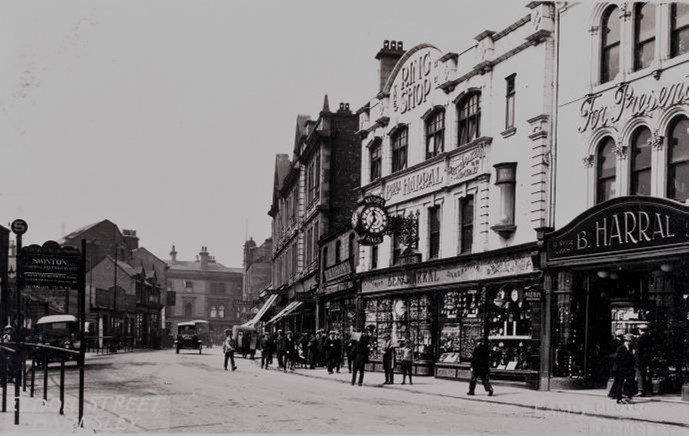
Maybe you remember the assortment of architecture, each remarkable adding to Eldon Street’s eclectic appearance. Bookended by two grand, classical style buildings – the canted Yorkshire Penny Bank at the Market Hill end and the Queen’s Hotel with carved stone heads at the Regent Street end – with the Baroque style Civic building in the centre.
But Eldon Street has lost its shine in recent decades, time and neglect wearing away its unique character.
Thanks to £4million in funding from Historic England and Barnsley Council, a four-year project is set to reinvigorate Eldon Street as the beating heart of Barnsley.
In 2020, Eldon Street was given High Street Heritage Action Zone (HSHAZ) status as part of a national programme aimed at unlocking the potential of high streets to fuel economic, social and cultural recovery.
The Eldon Street HSHAZ project is led by buildings archaeologist Dr Tegwen Roberts from Barnsley Museums. She is working with artists, students and communities in Barnsley to share creative ways to make Eldon Street an enlivening place that provides a new future for the high street.
Tegwen says: “Eldon Street has always had its own identity and we want to make the most of that. It’s a beautiful and unique space and the character of the individual buildings can be enhanced to create the vibrancy a modern high street needs.”
It’s easy to overlook the significance of a street and its structures, especially when you’re going about your business on autopilot. To the naked eye the shop fronts may seem mundane. But look a little further and you’ll see these buildings are silent witnesses to past eras and milestones, their architectural charm and imperfections telling the story of years gone by.
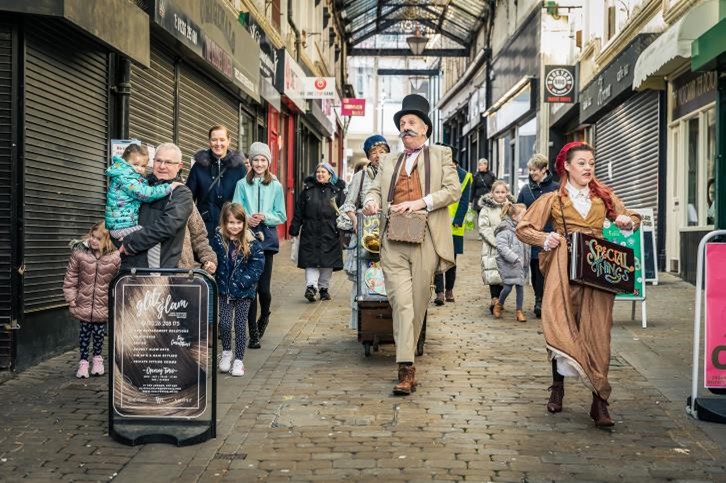
The HSHAZ project has been working with Yorkshire performers Mark Mark Productions and We Great Ladies to develop alternative history tours and a wider engagement programme to retell those stories to new audiences.
This summer you might see three Edwardian characters – the Un-Naturalists – walking through Eldon Street and the Victorian Arcade sharing stories of the people who once made these streets tick. Maybe you’ll see two brides teetering down Eldon Street, or ‘80s game show hosts having a nosey in your shopping bag.
Earlier this year at the Love Barnsley Festival, Barnsley-born artist Liz West brought her colourful Hymn to the Big Wheel installation to the Glass Works Square to shed a new light on Eldon Street. And in September, poet laureate, Simon Armitage, will be showcasing new work titled ‘Barnsley: an unnatural history’ inspired by stories of Eldon Street.
There has also been an animation produced highlighting the previously untold stories of the many women entrepreneurs of Eldon Street from the 19th and 20th centuries who disregarded societal norms to build blossoming businesses.
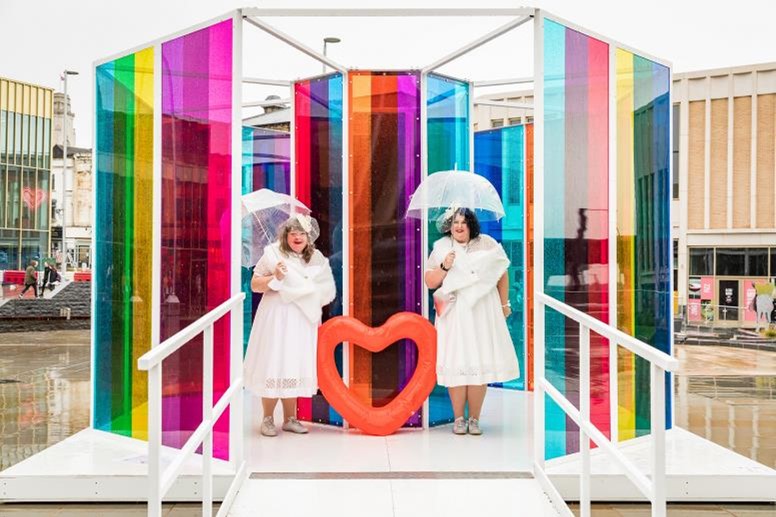
Women ran pubs, confectioners, cafés, draperies, tobacconists and more, but they rarely advertised under their full names, often relying on word of mouth and repeat custom due to the way some parts of society viewed women entrepreneurs.
One of the most influential women business owners on Eldon Street was Ann Porter who opened Barnsley’s first department store specifically for women. Rather than inheriting a family business, Ann set up a small shop on Sheffield Road after her husband, Benjamin Porter, a gas maker, died in the 1870s and she was left to raise five sons. The shop then relocated to a larger store on Eldon Street which had previously been a textile warehouse and animal feed shop. A Porter & Sons sold everything from kitchenware to fashions and all customers received a free cup of tea.
The building is one of the oldest surviving on Eldon Street and would once have had a double frontage, the off-road entrance having become hidden by the neighbouring building. It’s now owned by Leslie Frances hair design.
A key part of the project involves funding conservation work to restore, repair or revamp some of the historic shopfronts and buildings on Eldon Street’s west side. Business owners or landlords can apply for grants to improve the condition of buildings, reinstate lost architectural features and bring empty upper-floor space back into use.
The face of Eldon Street has continued to change with each new decade since it was first laid out in 1840 following an act of Parliament that called for a programme of improvements to Barnsley town centre. Eldon Street became the first of a new set of wider streets created on the edge of the medieval settlement and soon became a mixed commercial and cultural area.
By the time the new railway opened in 1850, Eldon Street had become the main gateway into town and this connection has long continued. Horse-drawn taxi cabs soon became trams and trolleybuses. People from outside the town who have ever visited on public transport will have walked down Eldon Street.
Throughout the 20th century, Eldon Street and its adjoining Victorian Arcade, which opened in 1892, became home to a range of household names. Woolworth, Halfords, the Famous Army Stores, Thorntons and Burtons were some of the bigger national brands. But over the years, Eldon Street has seen all manner of shops and businesses, from photographers to plumbers, cleaners to chemists, and wallpaper shops to wine and spirits merchants.
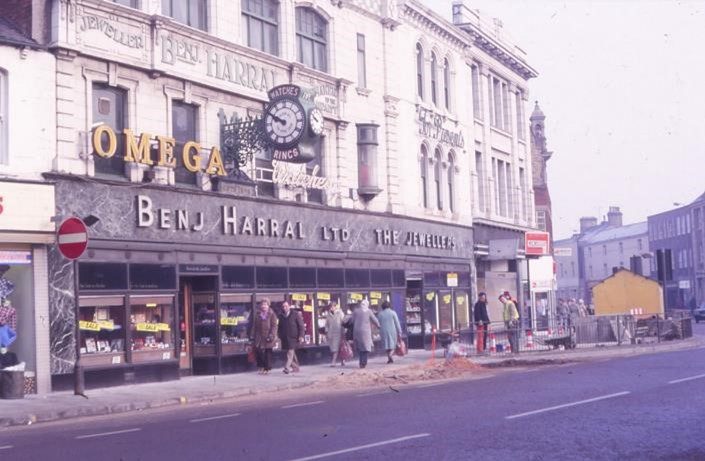
Benjamin Harral’s ring shop was one of the most well-known shops, famous for its elaborate window displays and magnificent marble façade, a real showpiece frontage, much of which has been stripped away. But one peculiar element that does remain is a long, thin protruding window. Its origins were previously obscure, until the HSHAZ project brought to light a memory from an elderly gentleman of a golden clock that was in the window in the 1930s.
After some digging, Tegwen found the golden clock was in fact a time ball, a now antiquated time-keeping device that was primarily placed on observatories for use in maritime navigation. How this fisherman’s friend ended up in Barnsley is still unknown, but Harral was a clock and watch maker as well as a jeweller. His time ball used the wireless signal from the Eiffel Tower to raise and drop the ball at 11am each day
One of Barnsley’s proudest buildings, and a key component in the Eldon Street HSHAZ, is The Civic which paved the way for self-development and education for ordinary working-class folk in Barnsley.
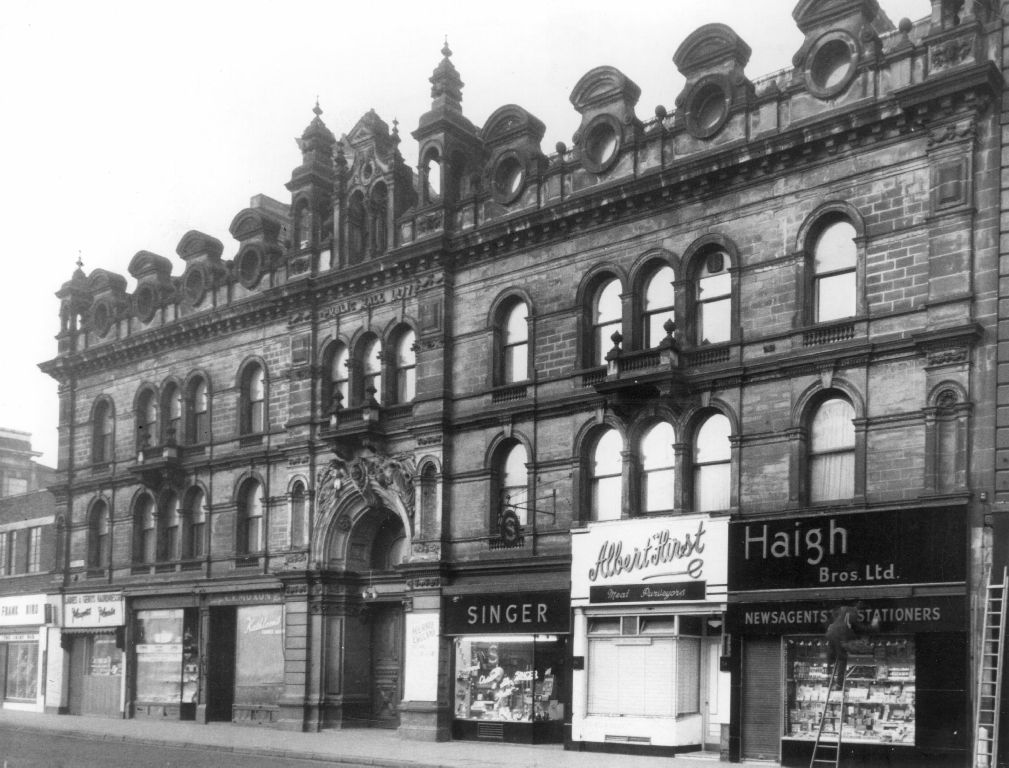
It opened in 1878 as the public hall and Mechanics Institute, funded by the Harvey family who were linen makers and philanthropists. The Harveys wanted to provided people in Barnsley with access to arts, culture and education. Along with six shops on the ground floor, the public hall had a library, reading room, games room and lecture hall. It also housed the public arts school on the top floor, which was a predecessor of Barnsley College.
The public hall, which later became the Harvey Institute and then the Civic Theatre, also had a 2,000-seater hall which hosted many variety shows, cabarets speeches, prize days and exhibitions.
The Civic Theatre closed to the public in the late ‘90s and its shutters on Eldon Street have been down for some years. Redevelopment in the 2000s focused on the rear of the building which created a new art gallery and theatre space, but the current Civic only uses about a third of the building.
However, part of the Eldon Street HSHAZ funding is being used to restore the magnificent Victorian front entrance of the building with elaborate mosaic floors and a grand ceiling. Plans include creating a bar and food offer, studio, workshop and events spaces, plus an extended gallery to offer more shows, events and exhibitions.
The Eldon Street High Street Heritage Action Zone runs alongside other large-scale developments in Barnsley such as the regeneration of the historic market and the creation of the Glass Works retail and leisure space.
High streets are no longer just about shopping. Visitors are looking for an experience, and Barnsley Council is committed to improving the quality of the environment and re-engaging with the public to retain that experience. Restoring Eldon Street’s character and historic features while introducing a creative arts programme will help make it a unique and attractive destination for residents and visitors alike.






